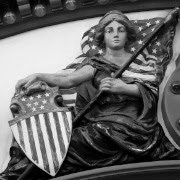So many interesting events and great podcast episodes lately, so little time to blog about them... Following are notes about and links to a few from this past week that I especially recommend...
Penn Jillette did a real good show last Monday, September 18th, regarding the Pope's recent comments and the violent fallout from them. Here's a direct download link from pennradio.com.
As an agnostic, it's pretty rare that I find myself paying any attention to what the Pope says, or feeling the need to take up his defense. But man have I felt sympathy for the guy in the very tall hat this past week. Though he seemingly did so inadvertently, in the course of quoting a historic work during a lecture to an academic audience, he's ended up saying something that I think very much needed to be said, in a way that very few in the West have had the courage to do. As I said here before, in an earlier post titled “Wanting to believe”, I don't know what it is about the apparent corellation between Islam and violent extremism. But there's apparently something to the connection that we need to better understand and can't allow ourselves to be intimidated out of talking about openly. The response from radical Islam this week, unfortunately, only served to illustrate the Pope's point.
I always look forward to Pajamas Media's consistently good “Blog Week in Review” podcast, adeptly hosted by Austin Bay and with Instapundit Glenn Reynolds as a frequent guest, and this week's talk with Mark Steyn about Mark's book “America Alone” was especially good.
Some particularly good moments from Mark:
[@ +19:00] Our whole way of forming the world view of tomorrow's citizens is by raising them in this rather, kind of fluffy non-judgmental cocoon. You know, I find it very interesting in American schools, I've got three young children in grade school. And they go on and on about self-esteem, you know, every individual has to have self-esteem. Self-esteem is very important. I went to an English boys' school where the object was, on the first day of term, to have every last ounce of self-esteem hammered out of you by the end of the first week. So it's an entirely different system to me. But my kids, they're taught all the time self esteem, self esteem's critically important. Well what about societal self-esteem? You know, what about saying that the society that you live in, the inheritance of that society is actually important and worth valuing too. And I think we don't do a very good job of that, and I think it poses a great question mark in the end over the long term future of that.
...
[@ +22:00] I think a lot of [that kind of] doom-mongering sells precisely because, in a sense, it is so unreal that it doesn't require any serious effort from you. You know, Al Gore is going around saying that, because of Earth's "excessive consumption" at the moment, it's put Earth "out of balance" with the rest of the universe. Well, you know, I don't know how he's measured that. But the fact of the matter is, if you pose that as the problem it is so unreal, that there is almost nothing you could do that would have any effect on it. So it becomes, in effect, a simple way of demonstrating your moral virtue to no purpose whatsoever. And there seems to be a streak in the psyche of kind of post-nationalist, post-modern man that would rather do that than actually attend to the hard practical problems that need dealing with now. The more pie-in-the-sky the problem is, the more universal and intergalactic it is, the more it seems to appeal to a particular disposition these days.
...
[@ +29:00] I think America really needs to think seriously about what allies it has, real allies it has, and do its best to shore them up. I'm immensely heartened whenever you go to Australia, because one of the most heartwarming features about Australia is you don't just get to talk sense with the right there, but there's a remarkable number of people who would identify themselves on the left in Australia who talk an awful lot of sense on this issue too. And I think America and Australia both understand ... what it is about. It's not about racism. It's not about being anti-immigration. But it's about understanding the importance of assimilating immigrants when they come here, and the only way you can do that is to have something they can assimilate with, which is a large part of the problem in Europe. Even if you wanted to assimilate with modern Dutch identity, what would it be? What would you do? And in America, whatever the problems here, there isn't the same problem with just huge, millions and millions of alienated immigrants that they have in most of Europe now.
I'm looking forward to reading Mark's book.
Another very interesting podcast this week was the September 19 Sanity Squad podcast, "A Religion of the Perpetually Paranoid", hosted as usual by neo-neocon, with commentators Dr. Sanity, Shrinkwrapped, and Siggy. One particular comment by Dr. Sanity at about 18 minutes into the discussion especially caught my attention, as it connected with my own concerns about worrisome alliances of thought that we've seen forming:
There is a very interesting intellectual connection. There's a book now that is apparently a bestseller in Turkey, which is one of the more moderate Muslim states, and it is called "Attack on the Pope". This is already a bestseller, this was a bestseller and existed before the pope ever made any comments, which predicts that Pope Benedict will be assassinated in Istanbul, which he is apparently scheduled to visit. There is also a movie, as you well know, about President Bush, "Assasination of the President", that just won an award at a Canadian film festival, that shows the assassination of a sitting United States president. And I think that it is not a coincidence that these two things exist in both ... and are celebrated in the intellectual halls of the Left, and in the intellectual (such as it is) aspect of Islam. There is something very strange going on in the world today, and ... the underlying thing is a lot of rage, and anger, and hatred that is coming out in this kind of format.
Last but not least, don't miss the Glenn & Helen's 9/18 interview with Jim Geraghty, which is chock full of insights that Democrats seeking election would be wise to pay attention to.





